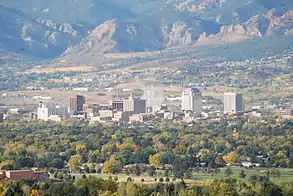Colorado Springs Airport
City of Colorado Springs Municipal Airport (IATA: COS, ICAO: KCOS, FAA LID: COS), known as Colorado Springs International Airport, is a city-owned public civil-military airport 6 miles (9.7 km) southeast of downtown Colorado Springs, in El Paso County, Colorado, United States.[2] It is the second busiest commercial service airport in the state after Denver International Airport. Peterson Air Force Base, which is located on the north side of runway 13/31, is a tenant of the airport.
City of Colorado Springs Municipal Airport | |||||||||||||||||||
|---|---|---|---|---|---|---|---|---|---|---|---|---|---|---|---|---|---|---|---|
 | |||||||||||||||||||
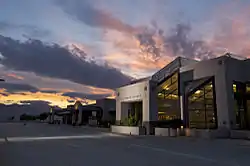 | |||||||||||||||||||
| Summary | |||||||||||||||||||
| Airport type | Public | ||||||||||||||||||
| Owner/Operator | City of Colorado Springs | ||||||||||||||||||
| Serves | Colorado Springs, Colorado | ||||||||||||||||||
| Elevation AMSL | 6,187 ft / 1,886 m | ||||||||||||||||||
| Coordinates | 38°48′21″N 104°42′03″W | ||||||||||||||||||
| Website | Colorado Springs Airport | ||||||||||||||||||
| Maps | |||||||||||||||||||
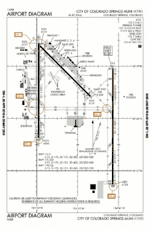 FAA airport diagram | |||||||||||||||||||
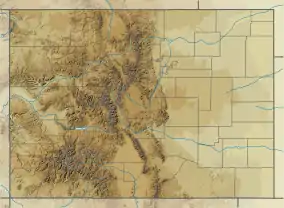 COS Location of airport in Colorado  COS COS (the United States) | |||||||||||||||||||
| Runways | |||||||||||||||||||
| |||||||||||||||||||
| Statistics (2019) | |||||||||||||||||||
| |||||||||||||||||||
Sources: Colorado Springs Airport[1] | |||||||||||||||||||
History
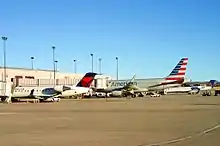
In 1927 the airport opened on 640 acres (260 ha) 7 miles (11 km) east of the city, with two gravel runways. In the late 1930s the first scheduled airline flight went from El Paso, Texas, through Pueblo, Colorado Springs, to Denver and back. The first municipal terminal was built in 1942 in an art deco style. Soon after the terminal was built the field was taken over by the military in the months preceding World War II. After the war, the city regained control.
In 1966 a new terminal was built on the west side of the runways, just east of Powers Boulevard. This terminal expanded by the 1980s, with a six gate addition. By 1991 the airport had three 150-foot (46 m) wide runways, one 13,501 feet (4,115 m) long, making it the longest runway in Colorado until 16R/34L, a 16,000-foot (4,900 m) runway, opened at Denver International Airport in September 2003. In 1991 the city approved a new terminal, two miles east of the former terminal, in the south-center part of the airport. The 280,000-square-foot (26,000 m2) terminal opened on October 22, 1994 with 12 gates; it was designed by the Van Sant Group and cost $140 million. In the 1990s a second, 5-gate concourse was added on the east side of the main terminal.
In 1996, the 1941 passenger terminal, two hangars, and a caretaker residence — by that time all located on Peterson Air Force Base — were inscribed on the National Register of Historic Places. They form the campus of the Peterson Air and Space Museum.[3][4]
From the 1980s to the present day, the airport has tried to expand service. The largest number of passengers was nearly 5 million in 1996 when now-defunct Western Pacific Airlines had a hub at COS (they moved it to Denver International Airport in late 1996). Their timetable for 15 June shows 33 daily departures to 20 airports between the west coast and Newark and Washington Dulles. Frontier Airlines added and dropped various routes from Colorado Springs throughout the 2010s.[5] Southwest Airlines announced in October 2020 that they would start serving the airport in 2021.[6]
Facilities
The airport covers 7,200 acres (2,900 ha) and has three paved runways: 17L/35R, 13,501 ft × 150 ft (4,115 m × 46 m) long, 17R/35L, 11,022 ft × 150 ft (3,360 m × 46 m) and 13/31, 8,269 ft × 150 ft (2,520 m × 46 m).[2]
Terminal and gate information
Colorado Springs Airport has one terminal with two concourses. However, only one, the larger concourse housing gates 1–12, has ever been put to commercial use; the second concourse (called the Western Pacific Airlines concourse) contains gates 14–18 (there is no gate 13) and is now mainly used for meetings. Access between the concourses requires leaving the secure area, walking through the main terminal and down a long hallway.
Airlines and destinations
Passenger
| Airlines | Destinations | Refs |
|---|---|---|
| American Airlines | Dallas/Fort Worth | [7] |
| American Eagle | Chicago–O'Hare, Dallas/Fort Worth | [7] |
| Delta Air Lines | Atlanta | [8] |
| Delta Connection | Salt Lake City | [8] |
| Frontier Airlines | Las Vegas, Orlando, Phoenix–Sky Harbor | [9] |
| Southwest Airlines | Chicago–Midway, Dallas–Love, Denver, Las Vegas, Phoenix–Sky Harbor (all begin March 11, 2021)[10] | [11] |
| United Airlines | Denver | [12] |
| United Express | Chicago–O'Hare, Denver, Houston–Intercontinental, Los Angeles | [12] |
Cargo
| Airlines | Destinations | Refs |
|---|---|---|
| FedEx Express | Memphis, Grand Junction, San Bernardino |
Statistics
Top destinations
| Rank | City | Passengers | Carriers |
|---|---|---|---|
| 1 | Dallas/Fort Worth, Texas | 142,000 | American |
| 2 | Denver, Colorado | 94,000 | United |
| 3 | Phoenix–Sky Harbor, Arizona | 47,000 | American, Frontier |
| 4 | Las Vegas, Nevada | 44,000 | Frontier |
| 5 | Chicago, Illinois | 33,000 | American, United |
| 6 | Houston–Intercontinental, Texas | 28,000 | United |
| 7 | Salt Lake City, Utah | 26,000 | Delta |
| 8 | Atlanta, Georgia | 23,000 | Delta |
| 9 | Los Angeles, California | 17,000 | United |
| 10 | Orlando, Florida | 13,000 | Frontier |
Airline market share
| Rank | Airline | Passengers | Share |
|---|---|---|---|
| 1 | SkyWest Airlines | 328,000 | 34.34% |
| 2 | American Airlines | 258,000 | 27.05% |
| 3 | Frontier Airlines | 212,000 | 22.14% |
| 4 | Delta Air Lines | 42,000 | 4.40% |
| 5 | United Airlines | 28,310 | 2.96% |
Accidents and incidents
- On March 3, 1991, United Airlines Flight 585, a Boeing 737-291 flying from Peoria, Illinois, to Colorado Springs via Denver, crashed on final approach to Colorado Springs Runway 35 after a rudder malfunction caused the aircraft to roll over and dive, killing all 25 on board.
- On December 21, 1997, a Beechcraft King Air operated by Aviation Charter flying in from Minneapolis St. Paul International Airport impacted terrain at Colorado Springs Airport in fog during a missed instrument landing system (ILS) approach. Both passengers on board were Northwest Airlines mechanics being flown in to repair a Northwest Airlines aircraft at COS. The pilot and one passenger were killed, the other passenger sustained serious injuries.[15]
- On April 16, 2018, a fire broke out on the airport's roof. There were no casualties, but the event resulted in the airport being closed for a single day.[16]
See also
References
- Colorado Springs Airport, official website
- FAA Airport Form 5010 for COS PDF, effective April 26, 2018
- Mehls, Steven F. (March 1, 1996), National Register of Historic Places Registration Form: Original Colorado Springs Municipal Airport (PDF), retrieved February 21, 2018.
- National Park Service (November 22, 1996), Weekly List of Actions Taken on Properties: 11/11/96 through 11/15/96, archived from the original on May 26, 2017, retrieved February 21, 2018.
- "Frontier cancels seasonal flights out of the Colorado Springs Airport". January 8, 2020.
- https://www.prnewswire.com/news-releases/southwest-airlines-announces-initial-flight-schedules-for-chicago-ohare-and-colorado-springs-301161941.html
- "Flight schedules and notifications". Archived from the original on February 2, 2017. Retrieved 7 January 2017.
- "FLIGHT SCHEDULES". Archived from the original on June 21, 2015. Retrieved 7 January 2017.
- "Frontier". Archived from the original on September 12, 2017. Retrieved 7 January 2017.
- https://www.prnewswire.com/news-releases/southwest-airlines-announces-initial-flight-schedules-for-chicago-ohare-and-colorado-springs-301161941.html
- "Check Flight Schedules". Archived from the original on February 2, 2017. Retrieved 7 January 2017.
- "Timetable". Archived from the original on January 28, 2017. Retrieved 7 January 2017.
- "RITA BTS Transtats - COS". www.transtats.bts.gov. March 2020.
- "Colorado Springs, CO: Colorado Springs Airport (COS)". Bureau of Transportation Statistics. Retrieved 23 October 2020.
- Accident description for N100BE at the Aviation Safety Network. Retrieved on October 20, 2020.
- "Colorado Springs Airport cancels commercial flights after rooftop fire". Denver Post. April 17, 2018.
External links
- Official airport website
- Colorado Springs Municipal Airport at Colorado DOT website
- FAA Airport Diagram (PDF), effective January 28, 2021
- Resources for this airport:
- AirNav airport information for KCOS
- ASN accident history for COS
- FlightAware airport information and live flight tracker
- NOAA/NWS weather observations: current, past three days
- SkyVector aeronautical chart for KCOS
- FAA current COS delay information
- Flight path in Colorado Springs
